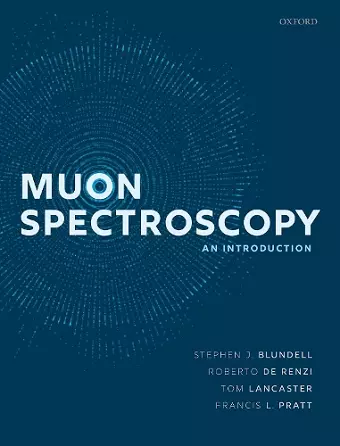Muon Spectroscopy
An Introduction
Tom Lancaster editor Stephen J Blundell editor Roberto De Renzi editor Francis L Pratt editor
Format:Hardback
Publisher:Oxford University Press
Published:10th Nov '21
Should be back in stock very soon
This hardback is available in another edition too:
- Paperback£41.49(9780198858966)

Muons, radioactive particles produced in accelerators, have emerged as an important tool to study problems in condensed matter physics and chemistry. Beams of muons with all their spins polarized can be used to investigate a variety of static and dynamic effects and hence to deduce properties concerning magnetism, superconductivity, molecular or chemical dynamics and a large number of other phenomena. The technique was originally the preserve of a few specialists located in particle physics laboratories. Today it is used by scientists from a very wide range of scientific backgrounds and interests. This modern, pedagogic introduction to muon spectroscopy is written with the beginner in the field in mind, but also aims to serve as a reference for more experienced researchers. The key principles are illustrated by numerous practical examples of the application of the technique to different areas of science and there are many worked examples and problems provided to test understanding. The book vividly demonstrates the power of the technique to extract important information in many different scientific contexts, all stemming, ultimately, from the exquisite magnetic sensitivity of the implanted muon spin.
Fundamental particles such as electrons and protons have been used since their discovery for uncovering the structures of materials and for diagnostics and treatment in medicine. Instruments called spectroscopes exploit the waves associated with energetic particles to glean information, much as X-rays were used to decipher the structure of DNA. In this text, authors introduce another fundamental particle called the muon and discuss its usage in spectroscopic analysis [...] covering properties of the muon, its interactive behaviors with surrounding materials, the history and physics of muon spectroscopy, and production of muons for experimentation. Each chapter includes solved and still-to-be-solved examples along with some model answers. Good illustrations and graphs support the description of this fascinating new method of delving more deeply into the structure of matter. * Nanjundiah Sadanand, Central Connecticut State University *
Such an introductory text is completely lacking at the moment, and I think that this team is the ideal choice for bringing an edited volume together. * Nicola Spaldin (Materials Theory, ETH Zurich) *
ISBN: 9780198858959
Dimensions: 254mm x 195mm x 27mm
Weight: 1108g
432 pages